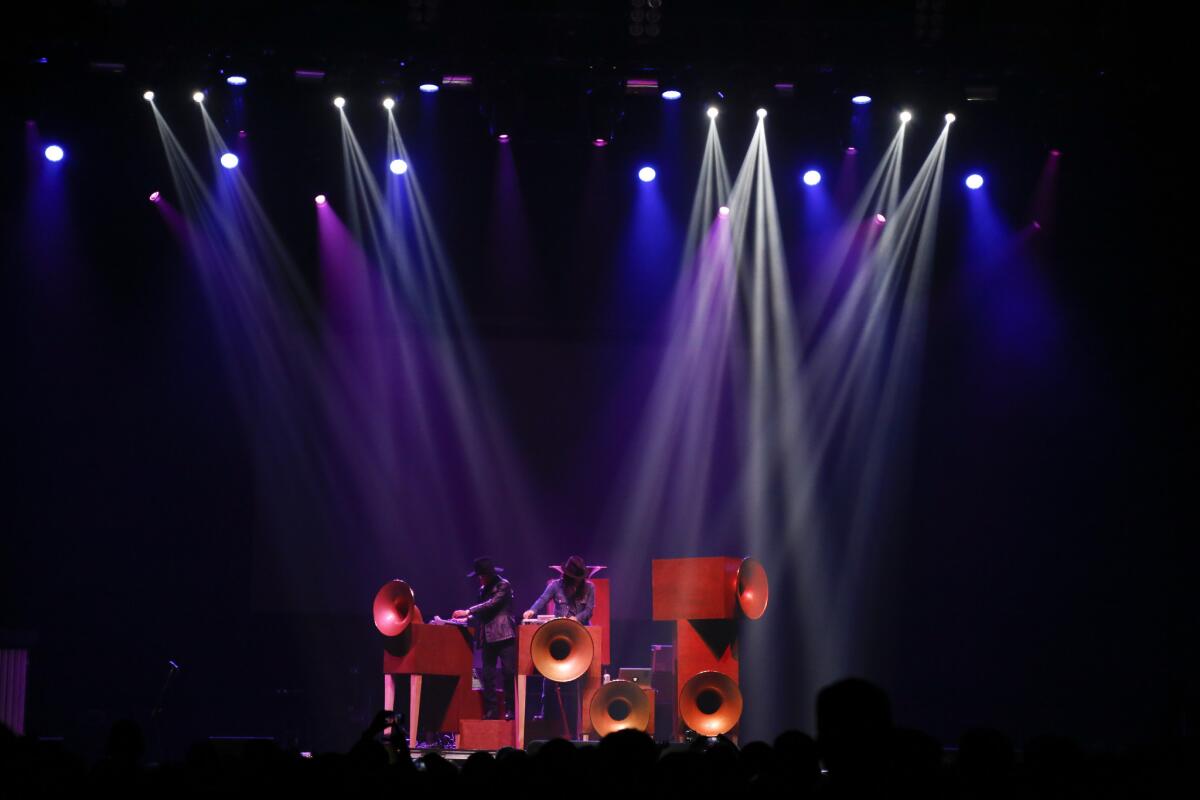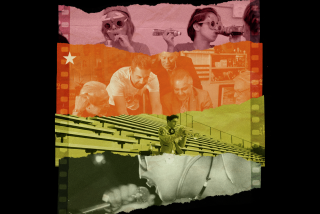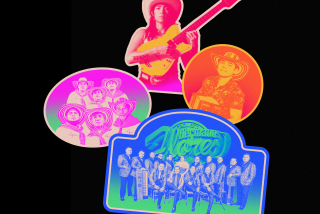Q&A: Nortec’s Bostich & Fussible on Tijuana cuisine, art and their final album

In 2001, a group of DJs from Tijuana unceremoniously released an album that shook up the world of electronica. The music fused the digital sounds of synthesizers and drum machines with the brassy oompah beats of Mexican norteño. The result was a style of music that managed to be both hot and cold, laid-back and bouncy, full of deep dark synth and bright fluttering accordions. There was nothing else like it out there.
That album, “The Tijuana Sessions: Vol. 1”, earned accolades in the pages of Time Magazine, Rolling Stone and the L.A. Times for the Nortec Collective, as the loose affiliation of Tijuana DJs and musicians came to be known. Follow-up albums, such as “Tijuana Sessions, Vol. 3,” “Tijuana Sound Machine” and “Bulevar 2000,” pushed the genre even further, including live collaborations with Mexican regional musicians. (Signs you’re at a Nortec concert: there’s a tuba player diving into the audience.)
Over time, the collective’s membership has ebbed and flowed. But the two original co-founders — a pair of DJs with the monikers Bostich and Fussible — have been the constant driving force. This fall the pair released what they say will be the final Nortec album.
“Motel Baja,” as the album is called, pushes boundaries in new ways, featuring collaborations with musicians from Kraftwerk and Tom Tom Club. It also contains the first classical music lick for Nortec: a baroque interlude in the album’s title track.
Bostich (born Ramon Amezcua) and Fussible (Pepe Mogt) took time to chat with me about their storied career shortly before taking the stage at the Regent in downtown Los Angeles on Wednesday evening as part of the Red Bull music series Panamérika.
The pair discussed why they’ve decided to retire the Nortec sound, Tijuana’s changing profile, and whether the rumors are true that they’re abandoning music to open a taco stand.
Question: I think a lot of fans, myself included, are disappointed to find out that this will be the final Nortec album. Why put an end to things now?
Fussible: We invented the Nortec sound. It was 15 years ago. And we really love it. But for us, it’s time to close that chapter. We already did almost everything: experimenting with classical orchestras, we toured all over the world, we even did music for movies, a full-length silent movie called “El puño de hierro” [“The Iron Fist”]. It’s a 1927 movie, [a drama] from [director] Gabriel Garcia Moreno. Very futuristic. Very weird. We did a lot of things with Nortec. So I think it’s the right moment to leave it with an album that we love. Now it’s time for us to do a gig and say good bye.
An NPR story reported that you were moving on to other jobs. It said that Bostich was going back to dentistry (his pre-DJ profession) and that Fussible wanted to open a taco stand. Is that true?
Bostich: [Laughs.] We are going to keep doing electronic music, because it is the thing that we love. We love our other careers. I as a dentist and Pepe likes the engineering. But we love the electronic music and we are going to keep composing. We don’t know yet about the new material. But we keep experimenting everyday in our studio with our synthesizer and drum machines.
Fussible: At the end, me and Ramon are electronic musicians, so we are going back to our cages, which is the clubs. We belong to Nortec of course. But it’s now time to go back to our electronic laboratory.
The Nortec Collective’s first album, “Tijuana Sessions: Vol. 1” consisted entirely of sampling. By the second album, however, you began to work with live musicians. Reflecting back on your 15 years of production, how did that move change Nortec’s trajectory?
Fussible: Me and Ramon, we are electronic musicians. We played at raves and clubs. Very acid sound, very techno-oriented. Then we started to experiment with live musicians and it was a great time. Then it became our sound: tuba, accordion, trumpet. And it began affecting us in a good way. Suddenly, we find our albums in the world music section, which is good. We played at the WOMAD Festival [World of Music, Arts and Dance in England], and we’re playing in different countries with musicians from all over the world: Malaysia, Pakistan, India. So we had both worlds. We could be playing in a club or on the outskirts of a city playing with world music. For us, this fusion affected the way we were perceiving music. “Motel Baja” is collecting all of this, from synthesizer stuff to world music sounds.
On other albums, you’ve worked around a narrative theme. For “Tijuana Sound Machine,” it was a story about a car that traveled around and beyond Tijuana, with each song capturing some element of a journey. What was the story behind “Motel Baja?”
Fussible: The theme is about a motel based on Tijuana. And you know what things can happen in a motel. A motel in Tijuana, it can be for people who are coming from other towns in Mexico. There are people that want to cross the border or they want to do business. So we tried to cover all of these situations in the album. There’s a coyote [an immigrant smuggler], a couple, kids from California stuck in a motel, very drunk, and they don’t know what to do. The album is the telling of all the stories.
The pieces fluctuate from darker compositions to songs that sound a little bit more techno dance party. What were you going for sonically?
Fussible: It’s the Nortec sound, but it’s more developed, more complex. All the expertise that we got in the other albums, you can find it here. There is classical music mixed with tubas, an electronic collaboration with the guy from Kraftwerk. It can be mellow, [like the song] with Tom Tom Club, or more tech-y, with the guy from Señor Coconut.
Q: So tell me what stories some of these individual songs tell.
Bostich: With “Temporary Paradise” I was trying to talk about the situation that we lived with in Tijuana in the hard days. The most difficult years [were 2007 to 2010]. At that time, a lot of people were afraid to go in the streets [at] night because they could get kidnapped or have something to do with the violence. At that time, a lot of families moved from our city to Chula Vista or San Diego [in the United States]. Or people would stay living in Tijuana, but they erase their names from the telephone directory. That song tells the story those years.
I invited Kylee Swenson from the the band Loquat. She sang the song. And I collaborated with a composer from Mexico City. He did the score for the classical music. That was the first time we put classical music in the middle of a Nortec song. It was totally different for us.
Did you both live in Tijuana during that difficult period?
Bostich: Yes. All the albums have a lot to do with the reality that Pepe and I live in our city. With the album “Tijuana Sound Machine,” it was the time of violence in Tijuana. In “Bulevar 2000,” the next album, we traveled around the world watching and receiving. All that feedback, we put into this album. And this album, “Motel Baja,” we come back to our city and see it as a big motel. That is Tijuana.
The image of Tijuana in the United States is still tied to that era of violence. What is your view of where Tijuana is now?
Fussible: It is important to say that there was violence. But the violence, it was like drug cartels fighting to take a plaza. The violence was between them. It wasn’t so violent as other parts of Mexico. Things that are happening right now in [the southern Mexican state of] Guerrero, all these things that we saw in Ayotzinapa [with the 43 missing students]. Those places are really dangerous. But because we’re on the border, the U.S. was more worried. There was a lot of bad press for the city. The media was satanizing Tijuana: “Oh, Tijuana is very dangerous.”
But the bad press, I think, [also] began with September 11. The [U.S.] government became paranoid about the border. It was a hassle to cross. Not only for Mexicans, even Americans. Everyone was treated like a criminal or smuggler. People were tired of that and they said, “Well, I prefer not to go.” And people in Tijuana were like, “I prefer to stay.” That was the big change. Tijuana was a very touristic city. Then, many things died: clubs, the very touristic side.
Right now, it’s a safe place. I was with friends a couple of days ago, we were at a bar and we were talking about the sad situation of the country. At certain moment, we were like, “We are in heaven here.” Tijuana is a good city.
In fact, there is a lot of talk about an art and architecture boom, with artists occupying empty spaces left behind by the declining tourist trade and turning them into galleries.
Fussible: Yes, now people are recovering spaces. There was an art movement that was bigger than before. It’s a good moment now.
Bostich: And we have a movement of culinary arts. This “Baja Med” movement. It seems like every week, or very often, we have new breweries there. In Tijuana, people like to go to breweries.
Q: How has this changed the profile of the foreign visitors who do still go to Tijuana?
Bostich: We used to have the classic tourist that crossed the border, had fun, ate tacos, or went to eat lobster. But we have a new tourism in Tijuana. They cross the border, but they know more about the new restaurants than us. It’s changing the image of our city.
Fussible: Now you start to see new groups of people from [the U.S.]. I’ve been at concerts, very independent, indie rock, or electronic, jazz or other genres. Usually, you get only local people, but now you might see a group of American kids, every color: white, black, Asian.
Bostich: It’s changed a lot. Maybe 10 years ago, people would ask us, where are you from? And we’d say, “From Tijuana.” Ten years ago, people would say, “Oh, sexo y marijuana.” That has changed. Now they look to Tijuana as a city where there is something happening: about culture, about music, about food.
Going back to the question of violence, how has the case of the 43 missing students from Ayotzinapa resonated with the city?
Fussible: A lot of people took to the streets in Tijuana. Tijuana is very much in solidarity with that. We want to have a better country for us and for our sons. We have to go out in the streets to raise our voice to tell our government, “Enough.” They have to be more transparent with us. We cannot tolerate these missing students. In the past, we had all these girls disappearing in Juarez. In Tamaulipas, you have all these stories about immigrants that came from Guatemala and all over Latin America and they were kidnapped and killed. People were sad. But right now, people say, “Enough. We cannot tolerate this.” More and more, we are all feeling like brothers.
Looking back over the past 15 years, what is the most beautiful memory that Nortec has given you?
Bostich: I think that was in Guadalajara at the Juegos Panamericanos [Pan American Games]. We opened the games and it was for us one of the most impressive experiences. We were in the middle of this stadium with these fireworks and this music and more than 50,000 people interacting with us and the lights and the music.
Fussible: For me the most impressive was about three weeks ago. When we open a show we always put a countdown and the concert starts. Well, we played in Guadalajara at a massive event for like 25,000 people on the streets. We put the countdown: 6, 5, 4, 3 ... Then it would get stuck: 4, 3, 4, 3. Then we put 43 on the screen.
At the beginning when the numbers were stuck, everyone started to scream, “Ehhhh.” Protesting, like the hard drive was broken. Then when they saw the 43 in red, everyone got together. We were all together, all very connected, making this kind of protest. For me it was the most magical moment.
Find me on Twitter @cmonstah. Fussible can be found at @nortec_fussible and Bostich at @ramonbostich.
More to Read
The biggest entertainment stories
Get our big stories about Hollywood, film, television, music, arts, culture and more right in your inbox as soon as they publish.
You may occasionally receive promotional content from the Los Angeles Times.











